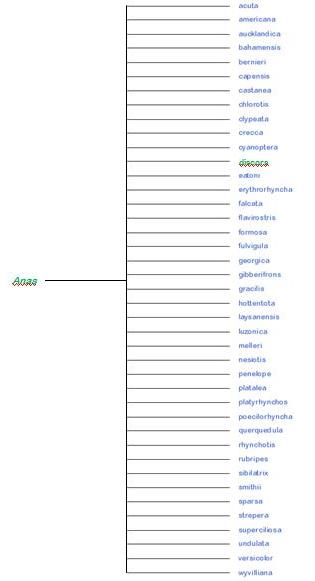
Classification
Domain- Eukarya

Kingdom- Animalia
Phylum- Chordata
Class- Aves
Order- Anseriformes

Family- Anatidae
Genus- Anas
Species- Anas
discors
This phylogenetic tree is
based off of the morphological traits of
dabbling ducks. It separates them based on the formality of the
common name and then relationships between the related species.
The Blue-winged Teal,
Anas discors,
belongs to the Eukarya domain
because it’s cells have nuclear envelopes and also contains membrane bound
organelles. It is found in the Animalia
kindom because it is multicellular, heterotrophic, and motile at some point in
its life. The phylum that the blue-winged teal belongs to is
Chordata because of the presence of
5 characteristic traits: 1.) a notochord, 2.) a dorsal hollow nerve chord, 3.)
pharyngeal pouches, 4. ) endostyle,
and 5.) a postanal tail. It is in the
Aves class because it is endothermic, there is a presence of feathers, and
it has a large breast bone allowing for wing flapping. The blue wing is found in
the order Anseriformes, which is
known as the waterfowl. They are strong swimmers and fliers, have three toed
feet that are webbed, long necks, flattened bills, and molt all flight feathers
at once restricting flight for a few weeks. It is found in the family
Anatidae because it is a swimming
bird with short legs and bills with a horny tip. This usually includes swans,
geese, and ducks. The genus the blue wing is found in is known as the
Anas genus. This genus contains
freshwater ducks, also called dabbling ducks. The blue-winged teal,
Anas discors, is different from other species because of its
characteristic light blue patches on the front of the wing which is visible
during flight and males having a white crescent on its head.
Below, the phylogentic tree was created in order to show the
many variety of species of the genus Anas. The most
similar species to Anas discors (the blue winged teal)
is Anas cyanoptera, (the Cinnamon Teal).

Previous
Home
Next


